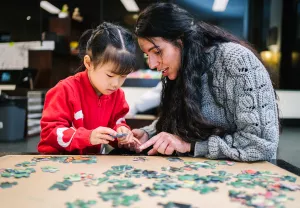Relational pedagogy in relationships with children
- Home
- Latest news
- We hear you
- Relational pedagogy in relationships with children

The excitement of welcoming new children and families into your service presents a unique opportunity for educators to focus on relational pedagogy. This ensures every child and family feel welcomed, supported and valued.
Research shows the importance of relational pedagogy in children’s optimal learning, development and wellbeing. When educators establish and maintain secure, respectful and reciprocal relationships, they enhance children’s ability to confidently express themselves, learn new things and take calculated risks.
Relational pedagogy is defined within the approved learning frameworks as underpinning the ways educators build trusting, respectful relationships between children, families, other educators and professionals, and members of the community. It emphasises how important these connections are for fostering children’s self-worth and establishing their place in the world as confident, active citizens.
The approved learning frameworks encourage educators to embed relational pedagogy in curriculum decision-making with children and families. Here are some examples of how practice might look.
- Under 2 years old: children and their families build secure attachment relationships with consistent and familiar educators.
- 2 to 3 years old: educators provide opportunities for children to express thoughts and feelings, offering patient, gentle and reassuring support.
- 3 to 6 years old: educators collaborate with children about routines, rituals and transitions, allowing children to demonstrate agency.
Educators actively prioritise nurturing relationships through mutually safe and responsive interactions. Providing consistent emotional support helps children feel secure, confident and included. Familiar routines and everyday rituals are tailored to children’s preferences, fostering self-regulation and social skills. Additionally, educators create a relaxed and unhurried atmosphere by engaging with children at their level.
Drawing on the work of Professor Alison Clark and Donna Green (2024), you may like to reflect on the 4 key themes of a slow pedagogy. Consider how this intertwines with the notion of relational pedagogy.
The themes include:
- Being with: prioritises time to ‘be with’ children, focusing on being attentive to the rhythm of children, colleagues and materials
- Going off track: values how children may take their learning in unexpected directions
- Diving deep with children: seeks to give children opportunities to go deeper with their learning through play rather than through shallow, detached learning activities
- Taking the longer view: values longer term thinking in contrast to the increasing pressures to meet short term goals and priorities.
Meaningful interactions between educators and children are characterised by warmth, care, responsiveness and respect. Critically reflecting on and adjusting interactions to support each child’s unique strengths and capabilities is essential. Respectful relationships play a significant role in a child’s sense of belonging within the service and the local community.
When establishing relationships and partnerships with new children and their families, encourage educators to embrace the principles of relational pedagogy and slowness. This helps build strong, supportive and meaningful relationships with each child and their family.
ACECQA resources
Information sheet - EYLF Principles - Secure, respectful and reciprocal relationships
Guide to the NQF - Standard 5.1: Relationships between educators and children